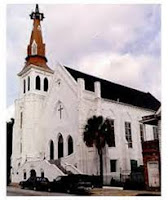 When we are young, we are often asked "What do you want to be when you grow up?" As a child or adolescent, we may have big dreams. When I was young, one of my favorite book series was Cherry Ames: Student Nurse. I imagined being a nurse, and then as I grew older, a doctor. By the time I graduated from high school, I had decided that I would purse a career in physical therapy or occupational therapy. Somehow, nearly thirty-years later, I am ordained as a Teaching Elder in the Presbyterian Church (USA).
When we are young, we are often asked "What do you want to be when you grow up?" As a child or adolescent, we may have big dreams. When I was young, one of my favorite book series was Cherry Ames: Student Nurse. I imagined being a nurse, and then as I grew older, a doctor. By the time I graduated from high school, I had decided that I would purse a career in physical therapy or occupational therapy. Somehow, nearly thirty-years later, I am ordained as a Teaching Elder in the Presbyterian Church (USA).There's a story to be told about how I got there.
My parents are well educated. Both were the first to go to college in their families. My father pursued an engineering degree, ultimately receiving his PhD in Industrial Engineering. My mom's original degree was in Home Economics, but she later got teacher certification in food services, and then a Master's degree in marketing education. She often teased my dad that she had accrued more credit hours than my dad earned with his PhD! Not only are my parents well educated, they were also professional educators, my mother in secondary education, and my father at the university level.
I grew up knowing I would go to college. In fact, I would say I was groomed for it.
So when I was in 8th grade and, my church gave me the opportunity to go to a career counseling center, my parents were all for it. A group of 8th graders went to the campus of Austin College, where we completed a seemingly endless array of personality, aptitude, and cognitive tests, all given with the purpose of helping us think about a career path. I don't remember much about it except that I REALLY liked the campus of Austin College. It was the first time I'd been on a college campus for a visit without a parent along - testing the waters, so to speak.
I was a good student. I excelled in math and science, and loved English and history. If I were a student today, I probably would be channeled into a STEM program. I was headed in one direction, and one direction only - a career in medicine. I never wanted to teach; it never even entered my mind. I was going to be a nurse.......or a doctor.......or a physical therapist.........or an occupational therapist.....
 Imagine my surprise when I received the results of the testing to discover that the two careers most fit my aptitudes and interests were TEACHER and MINISTER. I was dumbfounded. No way, I thought. I absolutely was not going to be a teacher, and in the mid-1970s, I didn't even know women could be pastors. I laughed it off, thinking the results were way off base.
Imagine my surprise when I received the results of the testing to discover that the two careers most fit my aptitudes and interests were TEACHER and MINISTER. I was dumbfounded. No way, I thought. I absolutely was not going to be a teacher, and in the mid-1970s, I didn't even know women could be pastors. I laughed it off, thinking the results were way off base.Fast forward a few years. I started college as an engineering major (not at Austin College, much to my dismay). After a couple of bad semesters <ahem>, I changed my major to secondary education with teaching fields of Biology and English. After all, I needed a degree that would get me a job, or so the parents said. I graduated, intending to still pursue a career in occupational therapy after a few years of teaching. I taught junior high life science for three years, and I really enjoyed it, but after three years, I was ready for graduate school. I was accepted into a Masters' Degree program for Occupational Therapy. As I was working my way through the coursework that year, I experienced a call to ministry. Once again, I changed directions.
As the years have passed, I have had time to think about my journey. The road had lots of twists and turns. Ironically, it led me directly to the two career paths I rejected in adolescence. What is it they say? "If you want to make God laugh, tell him your plans."


